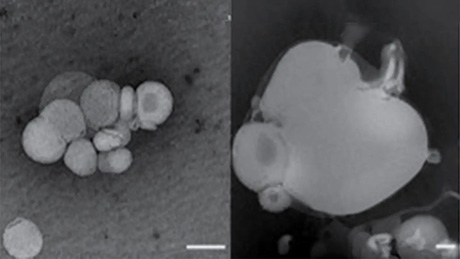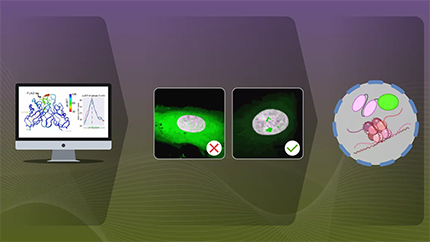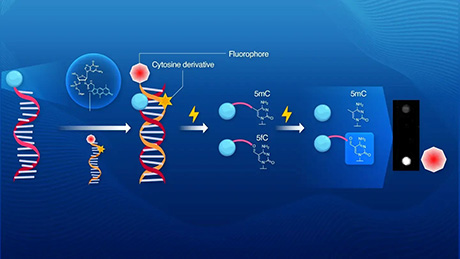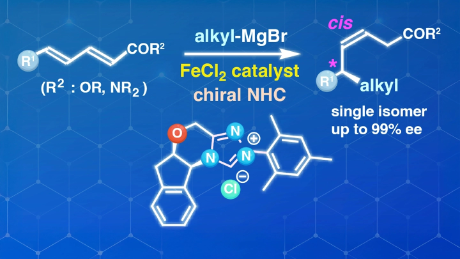Life Science and Technology News
2024 Tokyo Tech Challenging Research Award
The 23rd Tokyo Tech Challenging Research Awards were presented to eleven researchers each of whom will receive a research grant. The Suematsu Challenging Research Award was given to the three most highly qualified researchers among the Challenging Research Award winners. The award ceremony was held on September 13.
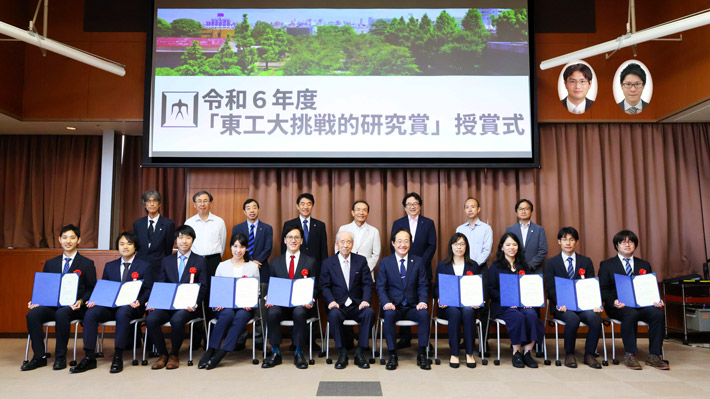
Commemorative photo with the award winners
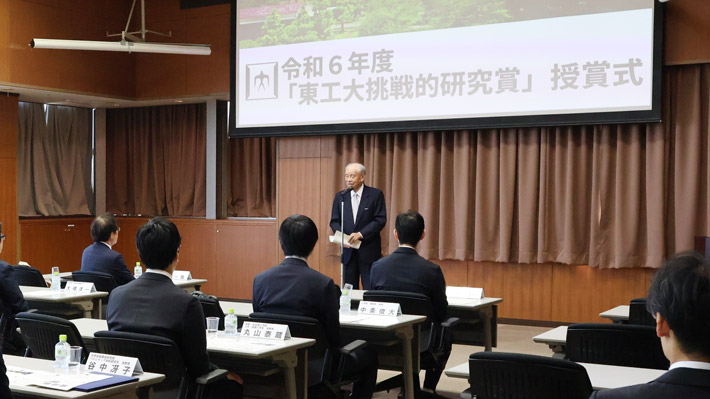

address
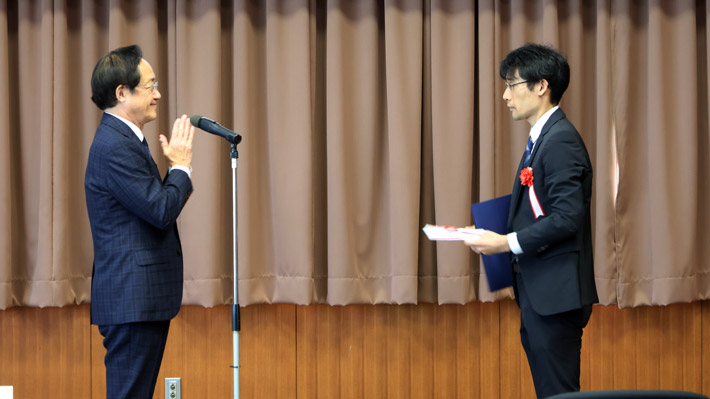

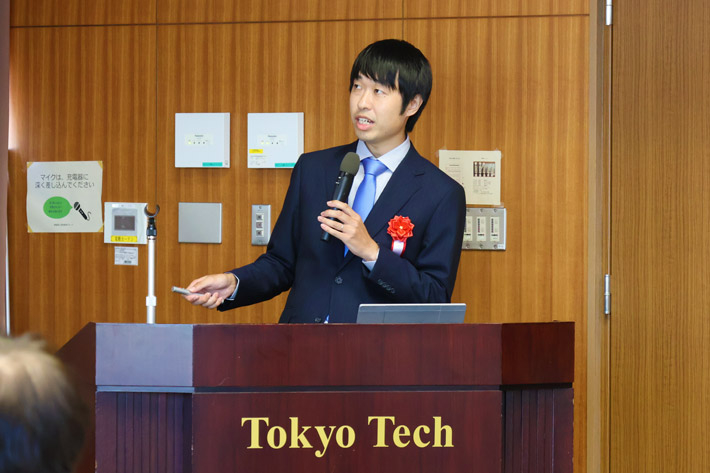

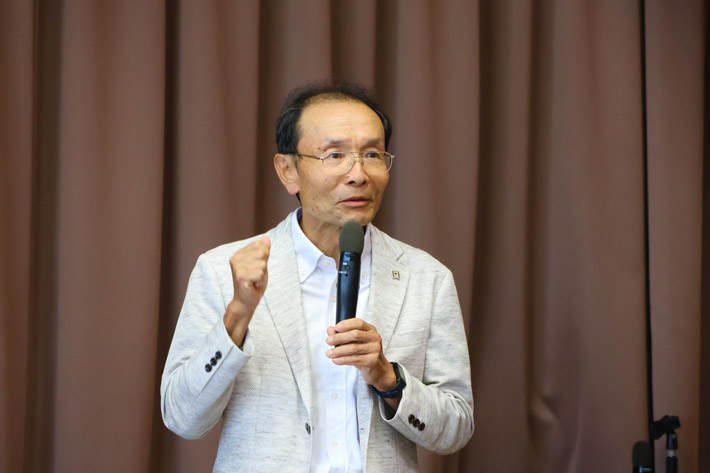

The grant was established with the aim of encouraging young faculty members at the Institute to engage in challenging research. It recognizes creative, up-and-coming researchers who boldly pursue the promotion of the most advanced research in the world, pioneering of new fields of study, innovative development of new research, and important issues that are difficult to solve.
The Suematsu Challenging Research Award is given to the highest qualified researchers among the Challenging Research Award winners. This award was established by the "Suematsu Fund", which was created based on the desire of former President Yasuharu Suematsu to support young researchers. When Professor Yasuharu Suematsu received the Japan Prize in 2014, he donated a portion of the prize money to Tokyo Tech, which established the Suematsu Fund to encourage young researchers. The Fund supports mainly young researchers to encourage their research activities to predict and study the development of unexplored scientific and technological systems in diverse fields and to bring the potential future to real society.
2024 Tokyo Tech Challenging Research Award recipients
Yuto MORITAKE
Assistant Professor, Department of Physics, School of Science
Exceptional-point plasmonic sensor and its application to quantum biology
- Yuto Moritake | Researcher Finder - Tokyo Tech STAR Search
- Department of Physics, School of Science
- School of Science | Schools | Organization | About Tokyo Tech
Kazuki YAMAMOTO
Assistant Professor, Department of Physics, School of Science
Theoretical study for realizing measurement-induced phase transitions in ultracold atoms
- Kazuki Yamamoto | Researcher Finder - Tokyo Tech STAR Search
- Department of Physics, School of Science
- School of Science | Schools | Organization | About Tokyo Tech
Toshihiro CHUJO
Assistant Professor, Department of Mechanical Engineering, School of Engineering
Integrated Attitude-Orbit Control and Mission Design of Solar Sail and Preparation for Technology Demonstration in Space
- Toshihiro Chujo | Researcher Finder - Tokyo Tech STAR Search
- Department of Mechanical Engineering, School of Engineering
- School of Engineering | Schools | Organization | About Tokyo Tech
Takashi HARUMOTO
Associate Professor, Department of Materials Science and Engineering, School of Materials and Chemical Technology
Hydrogen detection via correlation among electricity, magnetism, and strain
- Takashi Harumoto | Researcher Finder - Tokyo Tech STAR Search
- Department of Materials Science and Engineering, School of Materials and Chemical Technology
- School of Materials and Chemical Technology | Schools | Organization | About Tokyo Tech
Yasuhiko ORITA
Assistant Professor, Department of Chemical Science and Engineering, School of Materials and Chemical Technology
Design of acoustic responsive liposome based on CO2 dynamics and application for drug release technology
- Yasuhiko Orita | Researcher Finder - Tokyo Tech STAR Search
- Department of Chemical Science and Engineering, School of Materials and Chemical Technology
- School of Materials and Chemical Technology | Schools | Organization | About Tokyo Tech
Ayumi NAGASHIMA
Assistant Professor, Department of Life Science and Technology, School of Life Science and Technology
Identification of the solute selectivity mechanism of aquaglyceroporin by comparative and evolutionary physiological analysis
- Ayumi Nagashima | Researcher Finder - Tokyo Tech STAR Search
- Department of Life Science and Technology, School of Life Science and Technology
- School of Life Science and Technology | Schools | Organization | About Tokyo Tech
Taizo MARUYAMA
Associate Professor, Department of Civil and Environmental Engineering, School of Environment and Society
Development of wave propagation model in concrete
- Taizo Maruyama | Researcher Finder - Tokyo Tech STAR Search
- Department of Civil and Environmental Engineering, School of Environment and Society
- School of Environment and Society | Schools | Organization | About Tokyo Tech
Kozue NISHIDA
Associate Professor, Department of Transdisciplinary Science and Engineering, School of Environment and Society
Development of clumped isotope analysis techniques to unveil the habitat histories of marine organisms
- Kozue Nishida | Researcher Finder - Tokyo Tech STAR Search
- Department of Transdisciplinary Science and Engineering, School of Environment and Society
- School of Environment and Society | Schools | Organization | About Tokyo Tech
Saeko YANAKA
Associate Professor, Laboratory for Materials and Structures, Institute of Innovative Research
Comprehensive exploration of potential functional sites of antibody molecules
- Saeko Yanaka | Researcher Finder - Tokyo Tech STAR Search
- Laboratory for Materials and Structures, Institute of Innovative Research
Takafumi YAMAMOTO
Associate Professor, Laboratory for Materials and Structures, Institute of Innovative Research
Material design based on defect ordering
- Takafumi Yamamoto | Researcher Finder - Tokyo Tech STAR Search
- Laboratory for Materials and Structures, Institute of Innovative Research
Ryosuke TAKEHARA
Assistant Professor, Laboratory for Chemistry and Life Science, Institute of Innovative Research
Exploration of Unconventional Thermal Transport Originating from Molecular Dynamics
- Ryosuke Takehara | Researcher Finder - Tokyo Tech STAR Search
- Laboratory for Chemistry and Life Science, Institute of Innovative Research
Comments from the Suematsu Challenging Research Award winners
Yuto MORITAKE
Assistant Professor, Department of Physics, School of Science
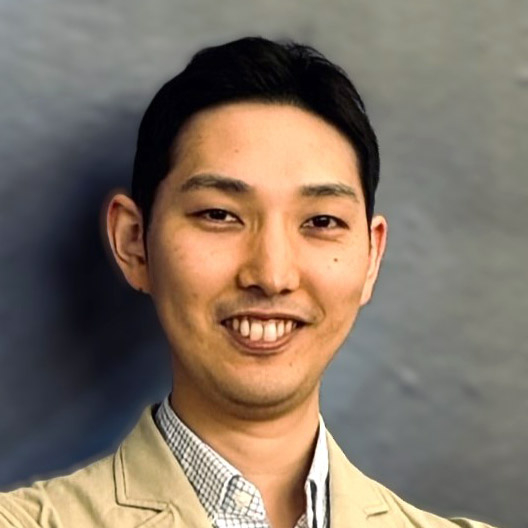

I am deeply honored to receive the prestigious Suematsu Challenging Research Award. It is particularly moving for me as a researcher in optical science to receive an award named after Professor Suematsu, who made significant contributions to this field globally. I would like to express my heartfelt gratitude to Prof. Masaya Notomi from the School of Science's Department of Physics and to all those who have supported me throughout my research journey.
Nanophotonics is a field that studies and controls light-matter interaction using structures on the scale of hundreds of nanometers, comparable to the wavelength of light. Recently, groundbreaking optical control mechanisms utilizing ideas from condensed matter and quantum physics have been reported. The purpose of my research project is to achieve highly sensitive optical sensing by applying the principles of non-Hermitian physics. This high sensitivity will be leveraged to detect quantum biological signals, which are typically difficult to measure due to their weak nature. Through interdisciplinary research spanning physics, engineering, and biology, the development of a new scientific principles and optical technologies is expected.
Toshihiro CHUJO
Assistant Professor, Department of Mechanical Engineering, School of Engineering
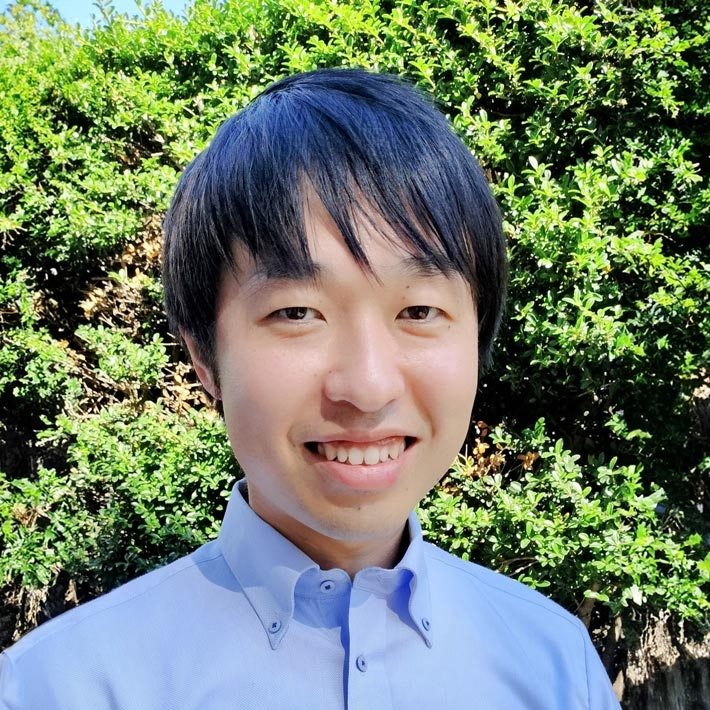

I am very honored to receive the prestigious Tokyo Tech Challenging Research Award and the Suematsu Challenging Research Award. I would like to express my sincere gratitude to my co-researchers, students and staffs in our laboratory and research group, and my family who supported my research.
Solar sails are a propellant-free propulsion system that uses solar radiation pressure. It is particularly compatible with lightweight micro spacecraft, and I believe it is one of the important technologies that will be useful for frequent space exploration missions by micro spacecraft. In order to use a solar sail, mission design (orbit/trajectory design) based on an understanding of orbital mechanics and control to follow the designed orbit/trajectory are required. However, since the orbital control of a solar sail is performed via attitude control, a concept of integrated attitude-orbit control is necessary. In this research, we established the integrated attitude-orbit control law using a gimbal mechanism equipped on the sail deployment part, and designed various orbits and trajectories assuming missions near the moon and Lagrangian points. We are also preparing for a technology demonstration mission in space, aiming to apply it to deep space exploration in the future.
Takafumi YAMAMOTO
Associate Professor, Laboratory for Materials and Structures, Institute of Innovative Research
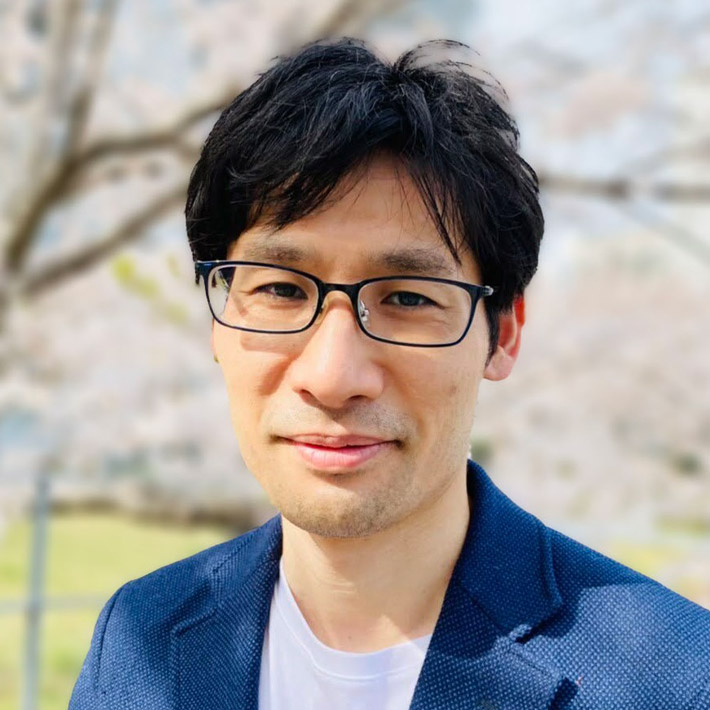

I am honored to receive the Tokyo Tech Challenging Research Award and the Suematsu Challenging Research Award. I would like to express my sincere gratitude to all those involved in the research.
I am working on the synthesis of novel materials of inorganic compounds. In this research, I aim to create various crystal structures by arranging the defects that form in crystals by controlling the synthesis method and composition. People may get a negative impression of the word 'defect', and in fact, in many cases, they cause various factors that degrade the performance of materials. However, if defects can be arranged periodically, they can become part of a beautifully aligned crystal structure and provide a means of controlling the properties of a material. Recently, we have shown that the concept of controlling defects, which was well-known for oxides, can be extended to organic-inorganic hybrid compounds, which have recently attracted attention in perovskite solar cells. In this research, I would like to provide pioneer methods that enable the free arrangement of elements and defects in various material groups and develop functional materials.
- Azuma-Yamamoto Group
- New Insight for Stabilizing Halide Perovskite via Thiocyanate Substitution | Tokyo Tech News
- A High-Pressure Flux Method to Synthesize High-Purity Oxyhydrides | Tokyo Tech News
- Advanced X-Ray Technique Unveils Fast Solid-Gas Chemical Reaction Pathways | Tokyo Tech News
Related Links
- 2023 Tokyo Tech Challenging Research Award | Life Science and Technology News
- 2022 Tokyo Tech Challenging Research Award | Life Science and Technology News
- 2021 Tokyo Tech Challenging Research Award Winners Announced | Life Science and Technology News
- 2020 Tokyo Tech Challenging Research Award | Tokyo Tech News
- 2019 Tokyo Tech Challenging Research Award | Tokyo Tech News
- 2018 Tokyo Tech Challenging Research Award | Tokyo Tech News
- Suematsu Fund | Areas of Support | Tokyo Institute of Technology Fund
- Challenging Research Award | Office of Research and Innovation
This project is supported by Tokyo Tech Fund Tokyo Institute of Technology Fund
Contact
Research Planning Division, Research Promotion Department
E-mail : ken.award@jim.titech.ac.jp

